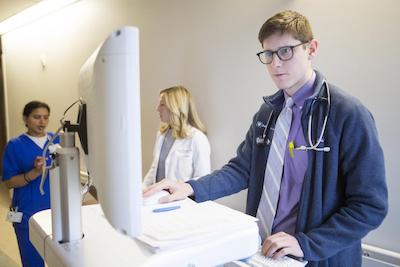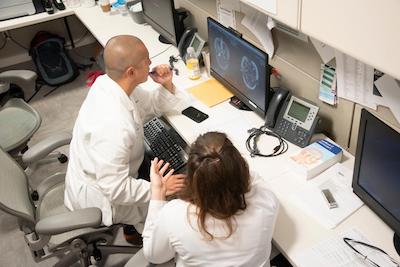PGY-1 (Intern Year)

The neurosurgery internship at Duke includes rotations in neurosurgery, the neurosciences intensive care unit (NICU), neurology, neuropathology, and neuroradiology.
Interns are paired with senior residents to assist in learning and to provide mentorship.
Call varies with rotation, and the department maintains overall hours of work at 80 hours per week on average or less. Surgery interns are given four weeks of vacation, plus five to six days off over the winter holidays.
Dinner is provided without charge in the Duke University Hospital cafeteria for all interns and residents on call.
PGY-2, PGY-3 (Junior Residency)
Over these two junior years in the neurosurgical residency, each resident completes 20 months (in five month blocks) on the neurosurgical services at Duke University Hospital.
The order in which the rotations are completed varies. Neurosurgical service rotations are completed with each resident spending four consecutive months as the junior resident for a given service to permit optimal learning through repetition and relationship building with faculty. The neurosurgical services are as follows:
Neurosurgery Services:
- Spine (2 rotations)
- Tumor
- Vascular/Functional
- Pediatrics
PGY-4 (Academic Year)
After completion of the junior residency, each resident participates in at least one academic year. This year is designed to provide opportunity for protected academic pursuits in any of a variety of arenas, limited only by individual resident interest or imagination. Recent endeavors have included basic research (all Duke University departments and faculty are available to residents); Duke programs in Neuroinnovation; degree-granting (master's) graduate programs in clinical sciences, health sciences, public health, or global health; industry internships; political/policy internships; endovascular fellowship; and/or clinical research.
As noted, residents are not discouraged from working outside of the Department of Neurosurgery in the fourth year. For those residents choosing to conduct neuroscience research, however, the department offers the physician-scientist track. Residents declare this track at the conclusion of intern year or early in PGY-2 year. Currently there are 30 approved faculty across Duke University who participate and serve as mentors. These have been divided into nine research concentrations. Once a resident selects a mentor and concentration, a PhD thesis-style committee is formed for the resident that meets regularly throughout the resident’s training to oversee their research and career milestones.
PGY-5 (Senior Year)

The PGY-5 year is designed to build broad general neurosurgical autonomy in operatively heavy rotations at the Durham Veterans Affairs Medical Center (DVAMC) (four months), and Duke Regional Hospital (four months). PGY-5 residents also spend a four-month block serving as the Pediatric Neurosurgery Chief at Duke University Hospital.
Durham VA Medical Center (DVAMC)
The DVAMC offers the only VA neurosurgery service in North Carolina, and is a destination neurosurgical site for the Southeast. It is located directly across the street from Duke University Medical Center and is staffed by Duke faculty neurosurgeons. The Durham VA has the only dedicated VA brain and spine tumor center in the state and the only VA epilepsy center on the East Coast.
The resident is in charge of the neurosurgery service at the VA, which has both a busy clinic and operating schedule running every weekday. Residents work with two full-time physician assistants, and staff operative cases daily with one of the Duke Neurosurgery faculty.
The rotation offers an excellent opportunity for the residents to function independently in all aspects of patient management, from preoperative planning through postoperative follow up.
Duke Regional Hospital (DRH)
DRH is a private, Duke-owned hospital located 10 minutes away from the main campus. It is staffed by Duke faculty neurosurgeons. Residents gain further experience in community neurosurgery during this rotation. DRH offers the capacity for residents to gain broad general neurosurgical independence one on one with faculty in a busy practice, before returning to Duke University Hospital for their PGY-6 chief year.
The DRH senior splits home call covering both DVAMC and DRH with their fellow PGY-5s rotating at the DVAMC.
PGY-6 (Chief Year)
Once residents have gained operative independence in general neurosurgical techniques, the PGY-6 year offers them the capacity to expand that independence into sub-specialty arenas. The PGY-6 year is the chief residency year at Duke University Hospital. Chief residents spend four consecutive months each on the tumor, spine, and vascular/functional services.
The chief residents are responsible for oversight for all aspects of care of the neurosurgical inpatients, as well as administrative duties including daily operative and call assignments. The chief residents are treated as junior faculty and viewed partners by the faculty. Chief residents divide home call amongst themselves.
PGY-7 (Transition to Practice Year)
This year is designed for residents to develop the specific skillsets necessary for their intended practice type. Options are again limited only by individual interest or imagination and include the following:
Enfolded fellowship: We offer the following CAST-approved fellowships at Duke: Neuro-oncology, Functional, Spine, Neurocritical Care, and Skull Base Surgery.
Academic (Physician-Scientist) Practice: Learn with mentorship to construct a “50-50” practice combining surgery and research. Each week will include one to two OR days, one clinic day, and two to three lab days, to prepare surgeon-scientists for the challenges of balancing the various components of their practice before they are on their own. Participants on this track are expected to prepare a K or R award application prior to completion, and they receive formal mentorship through Duke University programs in this process.
Research Year: Residents may take a second full research year. Participants on this track are expected to prepare a K or R award application prior to completion, and they receive formal mentorship through Duke University programs in this process.
Clinical Mastery: Residents may construct a custom clinical year aimed at garnering further sub-specialized operative skills (i.e. in skull-base, MIS spine, deformity, pediatrics, etc.) at any Duke site(s): DUMC, VA, Duke Regional, Duke Raleigh.
Typical 7-Year Program Schedule
| Year | Rotations |
|
PGY-1 |
Neurosurgery, 6 months Neuro ICU, 3 months Neurology/Neuropathology/Neuroradiology, 3 months |
|
PGY-2 |
Neurosurgery Spine Junior, 4 months |
|
PGY-3 |
Neurosurgery Tumor Junior, 4 months Neurosurgery Vascular/Functional Junior, 4 months Neurosurgery Spine Junior, 4 months |
|
PGY-4 |
Academic year #1 (research, approved activities, etc.). |
| PGY-5 |
Durham VAMC, 4 months |
|
PGY-6 |
Neurosurgery Spine Chief, 4 months Neurosurgery Vascular/Functional Chief, 4 months Neurosurgery Tumor Chief, 4 months |
|
PGY-7 |
Transition to Practice Year (Enfolded Fellowships, Academic Practice, Research Year, Clinical Mastery, etc.) |